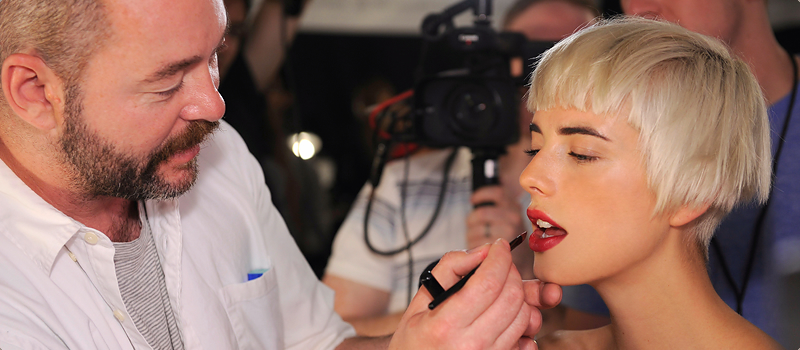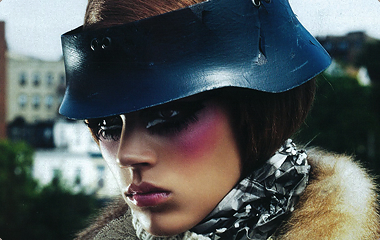Dick Page reveals his truest colors
The other side of make-up artist Dick Page
08 12/12 UP
Text:Tiffany Godoy Photo:Courtesy of Jed Root Translation:Miho Matsumoto

- ──
- What's the first thing you notice on a woman?
- It depends a lot on the woman. It has a lot to do with carriage and attitude. I notice the make-up but it is secondary. If I looked at it all the time I'd go out of my mind.
- ──
- Before you became a make-up artist you were a butcher?
- I used to work in a slaughterhouse -- I started when I was 13 -- because it pays more than delivering newspapers. It was after school or on the weekends. I grew up in the West of England. I was born on the South coast and moved to the west, and moved to London in '87.


- ──
- Before you moved to London were you interested in fashion and culture?
- I came from Bristol. The Bristol club scene was The Wild Bunch and Massive Attack and, later on, Portishead, which is actually the name of a shitty little town. I remember going to America and people would say "do you know Portishead" and I would say "yeah it is a shitty little town near where I come from." The weird thing is that England is so little. You don't get it till you move away. But it is so little and so influential -- culturally, globally. From this crappy little island all this music comes, all this fashion comes. Basically, for young people there is fuck all to do, so you just have to do it yourself. That kind of patchwork mentality comes from not having anything else to do. You can't spend that much time outside 'cause the weather is not that nice.
- ──
- There are so many parallels between London and Tokyo.
- Both are in island nations, both in post-empire situations. It used to be really great what happened [in London]. We fucked it up -- we still have this queen.

- ──
- Both have unique aesthetics, and British fashion has been so influential to Japanese fashion.
- And vice versa. They're the kinds of culture that foster eccentricities. They both are stereotypically seen as buttoned-up, repressed, and it's not really true. With British people it comes out in the humor, which is dark and borderline cruel.
- ──
- How do you like living in New York?
- I love it. The smallness -- it's a small town. It's a total village mentality. You walk everywhere and ride your bike. LA freaks me out because it's too fucking big. You have to go three-quarters of an hour all across town to get to work. In New York you tend to stay in one territory. I lived in the West Village for 10 years, now I live in Soho. Work-wise it's really easy. London was poor, for me. I was very creative but you can't eat creativity – it doesn't pay the rent. And I then I got to America and it was like: "You're paying me!"

- ──
- It seems like you have to compromise as a photographer, as a make-up artist, once you make the decision to leave for New York. Do you feel like you get to do really creative stuff?
- Yes I do, I'm lucky and it's because of some of the people I work with -- Juergen and Jenny Gage and Tom Betterton and the design stuff I do by myself working for Shiseido. But I'm on my own timeline, heading in my own direction. As you get older you don't feel the need to reinvent the wheel.
- ──
- It's more about refining your style and sensibility?
- Knowing more about who you are and what you can bring to certain situations. Or there's a certain designer you get on with. I've been working with Michael Kors for 10 years. We have totally different backgrounds and sensibilities, but we get along well and I can work his way, work in his world, and vice versa.


